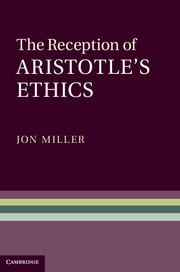Book contents
- The Reception of Aristotle's Ethics
- Contents
- Notes on contributors
- Acknowledgments
- A note on abbreviations and transliteration
- Introduction
- Chapter 1 The Nicomachean Ethics in Hellenistic philosophy
- Chapter 2 The transformation of Aristotle's ethics in Roman philosophy
- Chapter 3 Aristotelian ethics in Plotinus
- Chapter 4 St. Augustine's appropriation and transformation of Aristotelian eudaimonia
- Chapter 5 The Arabic and Islamic reception of the Nicomachean Ethics
- Chapter 6 Maimonides’ appropriation of Aristotle's ethics
- Chapter 7 The relation of prudence and synderesis to happiness in the medieval commentaries on Aristotle's ethics
- Chapter 8 Using Seneca to read Aristotle
- Chapter 9 Aristotle's Ethics in the Renaissance
- Chapter 10 The end of ends? Aristotelian themes in early modern ethics
- Chapter 11 Affective conflict and virtue
- Chapter 12 Kant and Aristotle on ethics
- Chapter 13 The fall and rise of Aristotelian ethics in Anglo-American moral philosophy
- Bibliography
- Index
Chapter 1 - The Nicomachean Ethics in Hellenistic philosophy
A hidden treasure?
Published online by Cambridge University Press: 05 February 2013
- The Reception of Aristotle's Ethics
- Contents
- Notes on contributors
- Acknowledgments
- A note on abbreviations and transliteration
- Introduction
- Chapter 1 The Nicomachean Ethics in Hellenistic philosophy
- Chapter 2 The transformation of Aristotle's ethics in Roman philosophy
- Chapter 3 Aristotelian ethics in Plotinus
- Chapter 4 St. Augustine's appropriation and transformation of Aristotelian eudaimonia
- Chapter 5 The Arabic and Islamic reception of the Nicomachean Ethics
- Chapter 6 Maimonides’ appropriation of Aristotle's ethics
- Chapter 7 The relation of prudence and synderesis to happiness in the medieval commentaries on Aristotle's ethics
- Chapter 8 Using Seneca to read Aristotle
- Chapter 9 Aristotle's Ethics in the Renaissance
- Chapter 10 The end of ends? Aristotelian themes in early modern ethics
- Chapter 11 Affective conflict and virtue
- Chapter 12 Kant and Aristotle on ethics
- Chapter 13 The fall and rise of Aristotelian ethics in Anglo-American moral philosophy
- Bibliography
- Index
Summary
Writing the reception history of the Nicomachean Ethics (N.E.) in Hellenistic philosophy is, arguably, an impossible task. The problem is not simply the paucity of evidence. We have no direct citations tying any doctrine discussed by Epicurean, Stoic, or Academic philosophers to views explicitly defended by Aristotle in the N.E., nor any direct evidence for familiarity in the Cyrenaic or Megarian schools. For all the evidence shows, Aristotle's N.E. was not cited by any philosopher outside the Peripatos in the period from the death of Alexander (323 bc) to the year Cicero wrote De Finibus (45 bc). That brings us almost all the way up to the year that is conventionally considered the end of the Hellenistic period, 31 bc. Even in the Lyceum Aristotle's voice falls strangely silent after the death of his successor Theophrastus of Eresus in c. 287 bc.
The lack of any direct reference proving that the N.E. was read in the Hellenistic period is perplexing in light of its profound impact on later ethical theory. But it need not trouble us if we can find strong reasons to infer that particular features of Stoic or Epicurean theories are best explained as developments of Aristotle's ethics. Thus, David Furley has argued that Epicurus’ account of the voluntary attempts to solve problems arising from Aristotle's discussion of responsibility for character in N.E. iii.5 (Furley (1967), 184–209). Similarly, A. A. Long has maintained that the Stoic category of “things in accordance with nature” and the attendant distinction between appropriate acts and successful acts develop essentially Aristotelian insights while equipping nameless Aristotelian categories with convenient labels. According to Long, “The Stoics borrowed many concepts, sometimes altering their language, from the Peripatetics and consciously developed or diverged from others…Stoic ethics cannot be completely understood without reference to Aristotle” (Long (1968)). Brad Inwood has reached a similar conclusion regarding Stoic action theory: “The early Stoic theory of human and animal action was influenced by Aristotle as much as was Epicurus’.” More recently, Terence Irwin has revived the late Hellenistic view that the disagreements between Stoic and Aristotelian ethics are less profound than critics tend to recognize. Irwin (1990) resists Antiochus’ view that the Stoics are merely recasting Aristotelian points in “violently paradoxical” language, for according to Irwin the Stoics are providing an important service by making clear Aristotle's true commitments.
- Type
- Chapter
- Information
- The Reception of Aristotle's Ethics , pp. 5 - 30Publisher: Cambridge University PressPrint publication year: 2012
- 4
- Cited by

